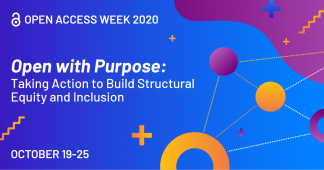Each year in late October, we mark Open Access Week — an international event to raise awareness of issues around access to scholarly publications and to inspire wider participation in open access publishing and projects.
 Information has value. Even if you might not use those exact words, the sentiment is one we all have felt at some point. The Association of College and Research Libraries’ Framework for Information Literacy explains the statement as follows:
Information has value. Even if you might not use those exact words, the sentiment is one we all have felt at some point. The Association of College and Research Libraries’ Framework for Information Literacy explains the statement as follows:
“Information possesses several dimensions of value, including as a commodity, as a means of education, as a means to influence, and as a means of negotiating and understanding the world. Legal and socioeconomic interests influence information production and dissemination.” [1]
Open Access Week’s theme for 2020, “Taking Action to Build Structural Equity and Inclusion,” provides an opportunity to reflect on the value of information as a commodity. We will explore this issue in the context of the move towards electronic content and conglomeration of the publishing system.
An electronic resource is not always more accessible than a print resource
Over the last 20 years — and even more so during this pandemic — libraries have been shifting from print to electronic collections. There are obvious benefits in terms of speed of access (i.e., one no longer has to visit a library and make photocopies of journal articles) and relief of the space issues facing many libraries.
However, there are significant drawbacks to electronic resources:
- Electronic versions of scholarly materials are subject to licenses, which often put strict limitations on who can use them. Libraries can share print materials by sending them through interlibrary loan — mailing materials to those who need them — but not all e-journal content can be shared this way. E-books usually can’t be shared between libraries, meaning that they are available only to those who have a current affiliation with the University or those who can physically visit one of our spaces.
- E-materials are expensive and often do not have the “friendliest” terms. Multi-user licenses are not always available or may be prohibitively expensive. In a time when University budgets are facing large cuts, it is hard to accept that a print volume may cost $100, yet the multi-user e-version might cost $900.
- Electronic materials also often lack perpetual access. This may mean that the same materials have to be purchased multiple times.
- Access to electronic materials also requires access to the internet — stable broadband access. This is often lacking for scholars all over the world; even in the United States, it is estimated that only three-quarters of adults have broadband internet service at home.[2]
Access to information is not determined by the availability of information
More research is produced today than ever before. However, this information is inaccessible to the majority of the world. Information is available to those who can afford it, rather than to all those who need it. Eifler and Phillips discuss this in context of the COVID-19 pandemic, calling back to 2003’s “Dismantling the Public Sphere” by John Buschman, which described “information capitalism”, where the market, “not scholarship, determines content availability.”[3]
One might have reasonably expected the costs of obtaining materials would have decreased, since there is no longer the need to print, store, and ship books, journals, and other physical items. Instead prices have increased dramatically.[4] What is lost when the cost of access outpaces university and library budgets?
- Fewer books are collected. As larger portions of library budgets are spent on journal subscriptions, there is less investment in books. This disproportionately affects disciplines for whom books are the primary research output, such as the humanities and social sciences. This creates a negative feedback loop: when there is less money available for books, there is lower circulation and readership of these materials. This leads to the appearance of lower value, leading to less future investment.
- Investments in other areas of the University are reduced. Increased spending on published materials means less money is available to support the rest of the educational mission of the University. Publishers will continue to drive university spending (and its budget) if we accept the current publishing system structure as is. Putting our students, faculty and staff first means fighting for equitable access, sustainable costs, and open access.
- Scholars are prevented from participating in the scholarly conversation. As Eifler and Phillips note, “…publishers act as gatekeepers determining who gets published. Scholars representing marginalized voices – frequently from the global south and in languages other than English – lack access to publishers of electronic books. In this way, larger publishers and distributors are responsible for an intellectual homogenization, thus undermining our academic libraries’ ability to connect people with scholarship.”[5]
The United Nations has stated that information literacy — the ability to find, evaluate, and use information effectively — “is a basic human right in a digital world and promotes social inclusion in all nations.”[6] The current scholarly publishing environment reinforces existing structural inequalities by perpetuating restrictive access to and engagement in scholarship. Open access creates new opportunities for researchers, students, and the public to participate in a broader dialogue.
Notes
[1] http://www.ala.org/acrl/standards/ilframework#value
[2] https://www.pewresearch.org/internet/fact-sheet/internet-broadband/
[3] https://academeblog.org/2020/08/12/library-collections-and-coronavirus-capitalism/
[4]https://www.libraryjournal.com/?detailStory=Deal-or-No-Deal-Periodicals-Price-Survey-2019 and https://alair.ala.org/handle/11213/14600
[5] https://academeblog.org/2020/08/12/library-collections-and-coronavirus-capitalism/
[6] United Nations Education, Scientific and Cultural Organization. (2006, June 1). Alexandria Proclamation on Information Literacy and Lifelong Learning. Retrieved from http://eprints.rclis.org/3829/1/alexfinalreport.pdf




